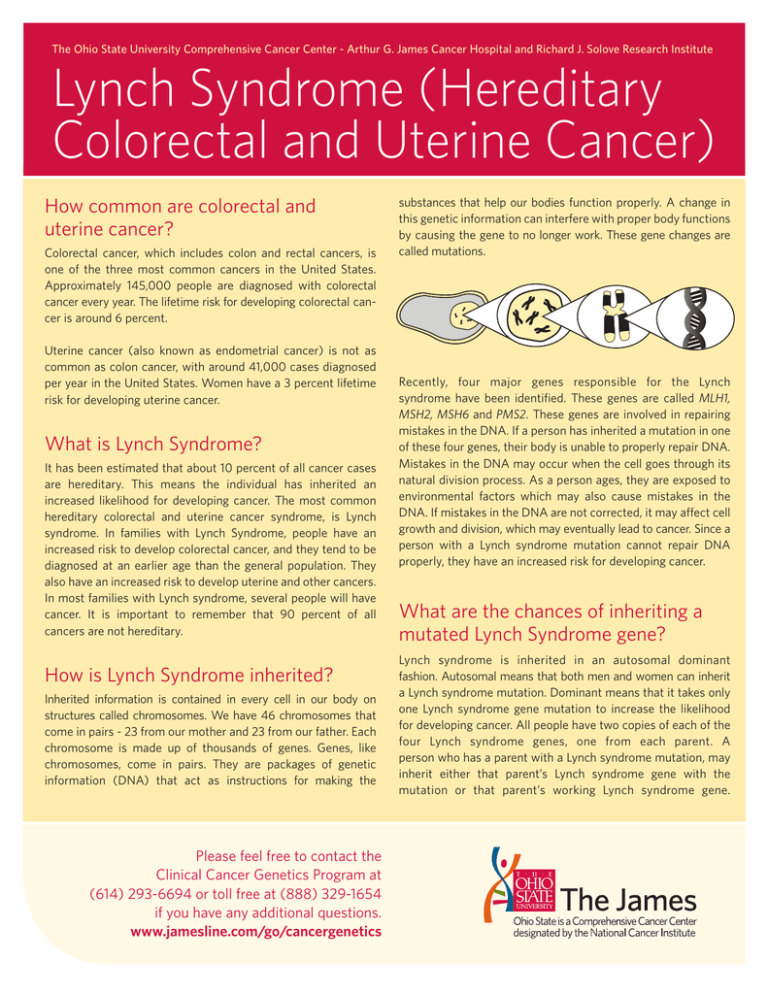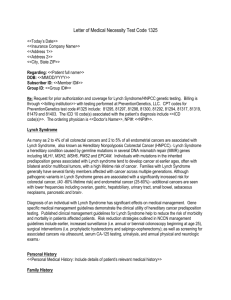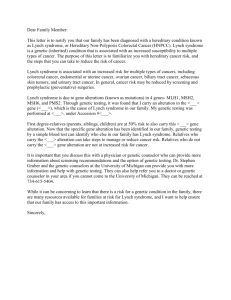Document 13725888
advertisement

The Ohio State University Comprehensive Cancer Center - Arthur G. James Cancer Hospital and Richard J. Solove Research Institute Lynch Syndrome (Hereditary Colorectal and Uterine Cancer) How common are colorectal and uterine cancer? Colorectal cancer, which includes colon and rectal cancers, is one of the three most common cancers in the United States. Approximately 145,000 people are diagnosed with colorectal cancer every year. The lifetime risk for developing colorectal cancer is around 6 percent. Uterine cancer (also known as endometrial cancer) is not as common as colon cancer, with around 41,000 cases diagnosed per year in the United States. Women have a 3 percent lifetime risk for developing uterine cancer. What is Lynch Syndrome? It has been estimated that about 10 percent of all cancer cases are hereditary. This means the individual has inherited an increased likelihood for developing cancer. The most common hereditary colorectal and uterine cancer syndrome, is Lynch syndrome. In families with Lynch Syndrome, people have an increased risk to develop colorectal cancer, and they tend to be diagnosed at an earlier age than the general population. They also have an increased risk to develop uterine and other cancers. In most families with Lynch syndrome, several people will have cancer. It is important to remember that 90 percent of all cancers are not hereditary. How is Lynch Syndrome inherited? Inherited information is contained in every cell in our body on structures called chromosomes. We have 46 chromosomes that come in pairs - 23 from our mother and 23 from our father. Each chromosome is made up of thousands of genes. Genes, like chromosomes, come in pairs. They are packages of genetic information (DNA) that act as instructions for making the Please feel free to contact the Clinical Cancer Genetics Program at (614) 293-6694 or toll free at (888) 329-1654 if you have any additional questions. www.jamesline.com/go/cancergenetics substances that help our bodies function properly. A change in this genetic information can interfere with proper body functions by causing the gene to no longer work. These gene changes are called mutations. Recently, four major genes responsible for the Lynch syndrome have been identified. These genes are called MLH1, MSH2, MSH6 and PMS2. These genes are involved in repairing mistakes in the DNA. If a person has inherited a mutation in one of these four genes, their body is unable to properly repair DNA. Mistakes in the DNA may occur when the cell goes through its natural division process. As a person ages, they are exposed to environmental factors which may also cause mistakes in the DNA. If mistakes in the DNA are not corrected, it may affect cell growth and division, which may eventually lead to cancer. Since a person with a Lynch syndrome mutation cannot repair DNA properly, they have an increased risk for developing cancer. What are the chances of inheriting a mutated Lynch Syndrome gene? Lynch syndrome is inherited in an autosomal dominant fashion. Autosomal means that both men and women can inherit a Lynch syndrome mutation. Dominant means that it takes only one Lynch syndrome gene mutation to increase the likelihood for developing cancer. All people have two copies of each of the four Lynch syndrome genes, one from each parent. A person who has a parent with a Lynch syndrome mutation, may inherit either that parent’s Lynch syndrome gene with the mutation or that parent’s working Lynch syndrome gene. Therefore, that individual has a 50 percent chance of inheriting the Lynch syndrome gene mutation and the increased likelihood for developing certain cancers. That person also has a 50 percent chance of not inheriting the Lynch syndrome gene mutation and would then have the same risk for developing cancer as the general population. mutation in only one of the two genes. Since mutations in MLH1 and MSH2 are much more common than mutations in MSH6 or PMS2, in cases where two proteins are absent we would start testing with the most common gene. Of course, in these cases testing sometimes may need to proceed to the second gene if a mutation is not found in the first gene tested. Are there any screening tests for Lynch Syndrome? Which screening test should be performed? There are two screening tests for Lynch syndrome: microsatellite instability (MSI) testing and immunohistochemistry (IHC) testing. Either or both of these tests can be performed on the cancer from a person suspected of having Lynch syndrome and are generally recommended prior to gene testing. These tests can be performed on a person’s cancer because pieces of their tumor are stored in a wax block for many years at the hospital where they had surgery. A person with an MSI positive tumor will usually have at least one stain absent on the IHC test. Likewise, someone with an absent stain on the IHC test will have an MSI positive tumor most of the time. When possible, we order both tests because they can serve to double-check each other. There are a variety of reasons why labs may not be able to perform one or both of the tests, and in these cases IHC may be more helpful because it can lead to targeted gene testing and potential cost savings. Many hospital pathology departments are starting to perform one or both of these tests routinely on all newly diagnosed colorectal cancers, so it is possible that you could have had this test done prior to your genetics appointment. This is helpful because it will allow us to move forward more quickly with the correct gene test when appropriate. What is microsatellite (MSI) testing? Microsatellite instability testing can be used as a screening test to determine whether or not a family is likely to have Lynch syndrome. Colon and uterine cancers from people with Lynch syndrome will usually show changes in areas of DNA called microsatellites. These changes are called microsatellite instability, or MSI. Tumors that have microsatellite instability are “MSI positive,” while those without microsatellite instability are “MSI negative.” The majority (around 95 percent) of colorectal and many uterine cancers from Lynch syndrome patients are MSI positive, while only about 10-15 percent of sporadic (not inherited) colorectal cancers, and up to 25 percent of sporadic uterine cancers, are MSI positive. A diagnosis of Lynch syndrome is more likely if a person’s colon or uterine tumor is MSI positive. A diagnosis of Lynch syndrome is very unlikely if a person’s colon or uterine tumor is MSI negative. What is immunohistochemistry (IHC) testing? Colon and uterine cancers can be treated with special stains that show whether the proteins made by the Lynch syndrome genes are present or absent in the tumor. This staining process is called immunohistochemistry, or IHC. If someone has a Lynch syndrome gene mutation, its protein will usually be absent in the tumor. IHC can help direct gene testing so that only one of the four Lynch syndrome genes may need to be tested (the one whose protein was absent in the tumor), which is much less expensive. For example, if the MSH6 protein is missing in the tumor, we would begin gene testing with MSH6. Because MSH2 and MSH6 are partners and MLH1 and PMS2 are partners, staining will sometimes be absent for both proteins when there is a If a person’s tumor is MSI positive and/or has absent stains on IHC, does that mean he or she definitely has Lynch Syndrome? No. In fact, four of five people with the most common abnormal Lynch syndrome screening test results (an MSI positive tumor that has the MLH1 protein absent on IHC) do not have Lynch syndrome. This is because there are two ways to stop the MLH1 gene from working properly. The first is by having an inherited mutation, in which case the individual has Lynch syndrome. The second, more common way to stop the MLH1 gene from working is by having an MLH1 gene mutation that was NOT inherited but instead occurred in one cell of the person’s colon at some time in life. In this case, the individual does not have Lynch syndrome but does have an MSI positive tumor. As a result, someone with an MSI positive tumor and absent MLH1 protein on IHC does NOT necessarily have Lynch syndrome, and additional testing may be needed before or after gene testing to help sort this out. If any of the other three Lynch syndrome proteins (MSH2, MSH6 or PMS2) are found to be missing by the IHC test, it is much more likely that the person has Lynch syndrome, because these genes are more likely to have stopped working because of an inherited mutation. If the Lynch Syndrome screening tests are normal, does it mean the individual does not have a hereditary cancer syndrome? If a person’s tumor is MSI negative and IHC shows that all four of the DNA repair gene products are present, it is highly unlikely that he or she has Lynch syndrome. In this case, genetic testing for the DNA repair genes would not be recommended. However, there are probably other colon and uterine cancer susceptibility gene(s) that have not been discovered yet which could be responsible for families with normal MSI and IHC results, so these results do not rule out a hereditary cancer syndrome. How are Lynch Syndrome gene mutations detected? It is possible to test for Lynch syndrome gene mutations. By taking a blood sample from someone who has had colorectal or uterine cancer, the laboratory can look for mutations in the Lynch syndrome genes. Once a mutation has been found in a Lynch syndrome gene, the laboratory can look for that same mutation in other family members (whether or not they have had cancer) to see if they have Lynch syndrome. What if testing reveals that a person has inherited a Lynch Syndrome gene mutation? People who have a Lynch syndrome gene mutation have a 5085 percent risk of developing colorectal cancer in their lifetime. A person who has already had colorectal cancer and is found to have Lynch syndrome has an increased risk for developing colorectal cancer again. People with Lynch syndrome also have approximately a 12 percent lifetime risk of developing stomach cancer. If a woman is found to have Lynch syndrome, she also has an increased risk of developing uterine cancer. The risk for uterine cancer is estimated to be 60 percent by age 70. In addition, women with a Lynch syndrome mutation may have an increased risk for developing ovarian cancer, approaching 13 percent. Other cancers that may be associated with Lynch syndrome in both men and women include: small intestine, biliary system, brain, skin and transitional cell carcinoma of the ureter and kidney pelvis. Research is taking place to better determine the risks of developing the cancers associated with Lynch syndrome. These risks may vary from family to family and from one individual to another. A person who has inherited a Lynch syndrome mutation is at risk to develop one or more of these cancers or may develop none at all. What if testing does not detect a Lynch Syndrome gene mutation? If a Lynch syndrome gene mutation is not found, it can mean several things. First, it might mean that there is a Lynch syndrome gene mutation that cannot be located by current testing methods. This is a limitation of many genetic tests. It might also mean that a different, as yet unidentified gene is responsible for the cancers in the family. Finally, it is possible that the cancers in the family are not hereditary. Since colorectal cancer and uterine cancer are relatively common diseases, it is possible that more than one person in a family may have these cancers by chance alone. If a person has Lynch Syndrome gene mutation, what are the options for cancer screening and prevention? People with Lynch syndrome have several choices. At a minimum, they should have careful screening to help find cancers at the earliest possible stage, when they are most easily treated. For colon cancer this means having a yearly colonoscopy to detect and remove precancerous polyps or to diagnose early cancers. In women with Lynch syndrome, yearly pelvic examination, ultrasound examination and small biopsies of the uterus are recommended in order to screen for uterine cancer. Screening for ovarian cancer is not very effective, however, women may choose to have an additional blood test in an attempt to help find ovarian cancer early. Screening recommendations for the less common Lynch syndrome cancers are determined separately for each family. Another option is to have surgery to remove at-risk body parts before cancer develops. This is called risk-reducing surgery. Risk-reducing colectomy (removal of the colon) is generally only considered when a person is unable to follow the colonoscopy screening recommendation. Risk-reducing hysterectomy (with removal of the uterus, ovaries and fallopian tubes) is often considered by women with Lynch syndrome as they approach the age of natural menopause. What are the possible risks of Lynch Syndrome gene testing? What are the possible benefits of Lynch Syndrome gene testing? The only physical risk of testing is that of a routine blood draw. However, other risks and benefits should be considered before undergoing testing. The process of genetic testing may be emotionally difficult whether or not a Lynch syndrome gene mutation is found. Finding a mutation may indirectly provide information about other family members, who may have chosen not to be tested. In addition, costs for the cancer screening and prevention options may or may not be covered by health insurance. Another issue of genetic testing is the possibility that the results could be used by an employer or insurance company to discriminate against a person. The Genetic Information Nondiscrimination Act (GINA) was signed into law in May 2008. GINA makes it illegal for health insurers to deny insurance coverage or charge a higher rate or premium to an otherwise healthy individual found to have a potential genetic condition or genetic predisposition towards a disease or disorder. Protections in health insurance will take effect in May 2009 or when a large group policy first renews after that date. GINA also makes it illegal for employers to use an employee's genetic information when making hiring, firing, placement, or promotion decisions. Employment protections will be implemented in November 2009. In the meantime, there is a national law already in place which specifies that pre-symptomatic genetic conditions cannot be considered a “pre-existing” condition by group health insurers (this law does not apply to self-insurers). While a single individual in a group plan cannot have their premiums raised, the federal law does not prohibit group insurers from raising the premiums of an entire group. There is also a state law that offers protection. Under Ohio law, insurers are not permitted to request genetic test results or use this information in determining whether to provide coverage, cancel a policy, or limit benefits. However, the law does not prohibit insurers from raising premiums for the entire group on the basis of genetic test results. Currently, the ability to obtain life and disability insurance are not protected by any laws. One of the major advantages of learning Lynch syndrome test results is reduced uncertainty about the risks of cancer for people and their families. In addition, the testing may allow doctors to modify medical care to decrease the risk of colorectal and other Lynch syndrome-associated cancers. Likewise, if Lynch syndrome testing is negative it may allow doctors to decrease the frequency of cancer screening. The decision to participate in Lynch syndrome gene testing is a complicated one. People and families must not only weigh the risks and benefits of testing, but they must also consider their unique situations. Ultimately, people must make their own decisions.

